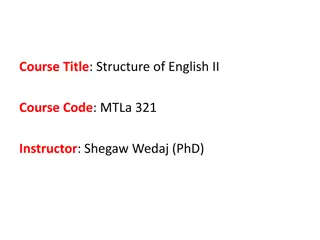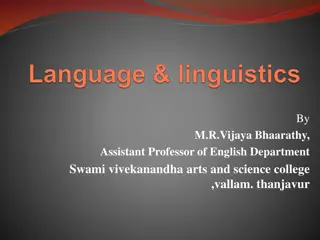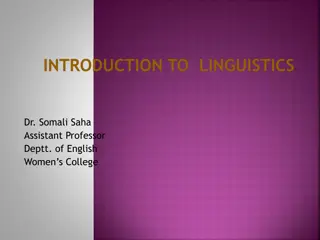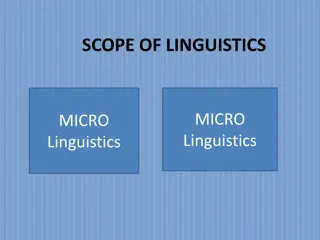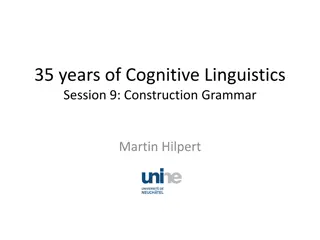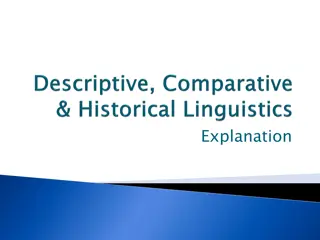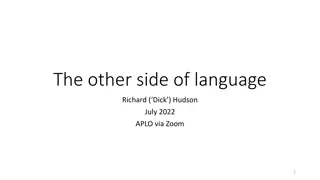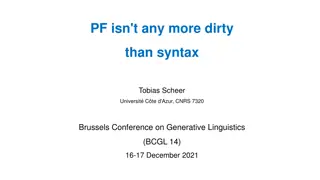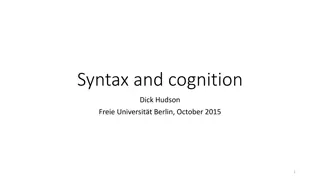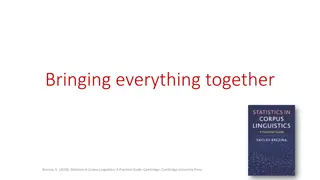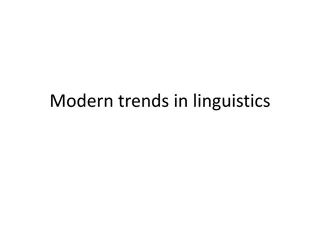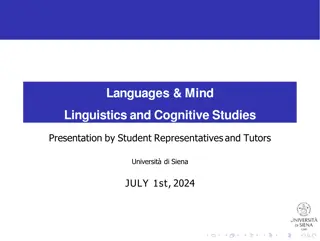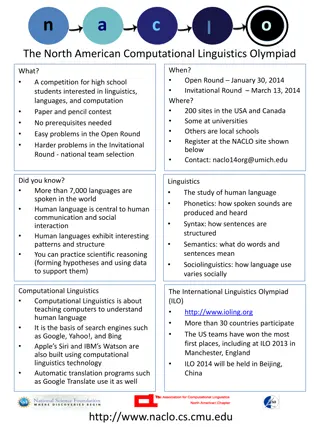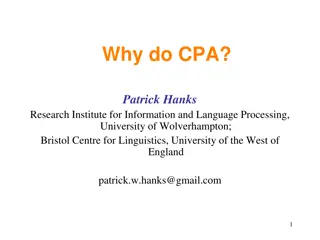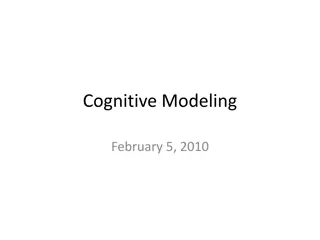Cognitive Load Classification with 2D-CNN Model in Mental Arithmetic Task
Cognitive load is crucial in assessing mental effort in tasks. This paper discusses using EEG signals and a 2D-CNN model to classify cognitive load during mental arithmetic tasks, aiming to optimize performance. EEG signals help evaluate mental workload, although they can be sensitive to noise. The
0 views • 19 slides
Brain Mineral Deposition and Cognitive Decline Study
Investigating the progression pattern of brain mineral deposition as a differential indicator of cognitive decline in individuals with varying cognitive statuses from normal to Alzheimer's disease. The study aims to develop improved imaging techniques and specific cognitive-relevant atlases to under
4 views • 24 slides
An Exploration of Stylistics in Linguistics: Expressive Means and Stylistic Devices 2. Stylistics as a branch of linguistics examines expressive means and stylistic devices which enhance the emotive and aesthetic qualities of language. These include
Stylistics, Linguistics, Expressive Means, Stylistic Devices, Language
5 views • 25 slides
Understanding the Cognitive Assessment System (CAS2) Theory and Applications
The Cognitive Assessment System (CAS2), developed by Dr. Jane Yeomans, is a comprehensive tool for assessing cognitive processes in children aged 5 to 18. Unlike traditional IQ tests, CAS2 focuses on areas like Planning, Attention, Simultaneous, and Successive processing. It requires Level 2 qualifi
1 views • 29 slides
Understanding Structural Linguistics: An Exploration of Language and Signs
Delve into the intricate world of structural linguistics through an in-depth analysis of language components, linguistic signs, and the relationship between language and linguistics. Explore the concepts of syntagmatic vs. paradigmatic relations, linguistic signs as associations of sound and meaning
4 views • 62 slides
Understanding Cognitive Behavioral Therapy (CBT) by Dr. James Ikonomopoulos
Explore the foundations and application of Cognitive Behavioral Therapy (CBT) through the work of Dr. James Ikonomopoulos. Uncover the connection between thoughts, feelings, and behaviors, learn cognitive and behavioral interventions for children and adults, and delve into the cognitive model of the
0 views • 64 slides
Understanding Cognitive Testing in Aging: A Vital Assessment Tool
Cognitive testing plays a crucial role in assessing cognitive abilities and distinguishing normal aging from disease states in older adults. This program, a partnership between OneWorld and UNMC's Geriatrics Workforce Enhancement Program, highlights the importance of cognitive testing, its objective
0 views • 17 slides
Introduction to Cognitive Behavioral Therapy (CBT) for Beginners
Delve into the origins, principles, and applications of Cognitive Behavioral Therapy (CBT) through an exploration of its history, theory, and practical skills. Learn how CBT targets cognitive distortions and behaviors to enhance mental health and develop coping strategies. Discover the fundamental a
0 views • 23 slides
Understanding Linguistics: An Overview of Language Study
Linguistics is the scientific study of human language systems, encompassing phonetics, syntax, semantics, phonology, pragmatics, and morphology. It explores how language functions, aids in language teaching, and facilitates error analysis. The scope of linguistics includes investigating sound system
1 views • 21 slides
Understanding Linguistics: Overview, Branches, and Scopes
Linguistics explores the study of language, encompassing its nature, structure, and functions. It delves into the characteristics of human language, definitions, branches such as applied linguistics and psycholinguistics, as well as scopes like microlinguistics and macrolinguistics. The field invest
1 views • 11 slides
Overview of Micro and Macro Linguistics
Micro linguistics focuses on the scientific study of speech sounds, word formation, syntax, and meaning within a language, while macro linguistics delves into the societal, psychological, and neurological aspects of language use. Micro linguistic areas include phonetics, phonology, morphology, synta
1 views • 7 slides
Understanding Human-Computer Interaction and Cognitive Learning Theories
Human-Computer Interaction (HCI) focuses on how people interact with computers, while theories like Sweller's Cognitive Load Theory and Mayer's Cognitive Theory of Multimedia Learning explain how individuals process information. These theories emphasize optimizing learning by managing cognitive load
4 views • 8 slides
Cognitive Stimulation Therapy in Post-Acute Care: A Pilot Study
Cognitive Stimulation Therapy (CST) is an evidence-based group intervention designed for individuals with mild to moderate cognitive impairment. It aims to enhance cognitive functioning through various activities such as executive functioning tasks, multi-sensory stimulation, and reminiscence work.
0 views • 9 slides
Predictive Performance of CSF A1-42 and Tau on Cognitive Decline and Dementia Progression
Analysis conducted at the Perelman School of Medicine, University of Pennsylvania, evaluated the predictive performance of cerebrospinal fluid markers A1-42, t-tau, and p-tau181 on cognitive decline and progression to dementia. The study included 2401 ADNI1/GO/2 CSF samples from individuals across d
0 views • 19 slides
Cognitive Behavioral Therapy for Psychosis: Concepts and Applications
Explore the foundational principles of Cognitive Behavioral Therapy (CBT) for psychosis, emphasizing how thoughts influence feelings and behaviors. Gain insights into the cognitive-behavioral model of paranoia and learn about the main tenets of CBTp. Discover how CBTp can effectively address psychot
0 views • 63 slides
Early Childhood Language Learning and Bilingualism
Early childhood is a critical period for language acquisition and the development of bilingualism. Exposure to multiple languages from a young age has significant cognitive benefits. Bilingualism is a common phenomenon worldwide, with many individuals speaking more than one language. The cognitive i
0 views • 109 slides
Exploring Construction Grammar in Cognitive Linguistics Symposium
Delve into the realm of Construction Grammar with Martin Hilpert in the 35th year of Cognitive Linguistics. Discover the intricacies of idiomatic constructions, the distinction between constructions and constructs, coercion in neologisms, and more. Explore the relationship between Construction Gramm
1 views • 81 slides
Understanding Applied Linguistics: Definitions, Rationale, and Purpose
Delve into the realm of applied linguistics through a comprehensive outline featuring historical perspectives, defining moments, and the overarching purpose of this field. Explore how applied linguistics tackles language-related social issues and addresses challenges in education and communication.
0 views • 12 slides
Brain Health Messaging for Health Education: Promoting Cognitive Well-being
Evidence-based programs for older adults focus on managing health conditions that are risk factors for cognitive decline, such as diabetes, smoking, and heart disease. By incorporating cognitive health messages into promotions, individuals are encouraged to address these risk factors early to suppor
0 views • 5 slides
Understanding America Study: Cognitive Functioning Measures
The Understanding America Study (UAS) focuses on developing web-based cognitive functioning measures, including tests for fluid abilities, verbal skills, executive function, and processing speed. Utilizing data from about 9,000 panelists, tests like the Stop and Go Switch task are administered onlin
0 views • 26 slides
Evolution of Linguistics: From Philosophy to Descriptive Study
Linguistics has evolved significantly from being a branch of philosophy to a distinct field called Descriptive Linguistics. It now focuses on studying language in itself rather than in relation to other disciplines, aiming to describe and analyze the structure and operation of languages at different
0 views • 20 slides
Addressing Cognitive Dysfunction in Patients with Cancer: Causes, Impact, and Treatment
Understanding cognitive dysfunction in cancer patients is crucial for improving quality of life and medical outcomes. This article explores the background, causes, screening, diagnosis, and treatment options for cancer-related cognitive impairment, emphasizing the historical perspective, prevalence,
0 views • 60 slides
Understanding Halliday's Systemic Functional Linguistics
Exploring the concepts of Systemic Functional Linguistics as introduced by Halliday, this text delves into the role of language in everyday interactions, cultural studies, and literary theories. It highlights the different functions of language - interpersonal, ideational, and textual - and their ap
0 views • 25 slides
Exploring Linguistics and the Linguistics Olympiad
Dive into the world of linguistics with retired Professor Dick Hudson as he shares his journey of discovery and passion for language. Explore the challenges and joys of the Linguistics Olympiad, bridging the gap between the hard and soft sides of language. Discover the intricate connections in langu
0 views • 41 slides
Master Programmes in Artificial Intelligence for Human-Centric AI Careers
Explore the world of Cognitive Systems and Cognitive Programming for Human-Centric AI at the University of Cyprus. Delve into building systems that think and behave like humans, learn from experiences, and adapt to changing circumstances. Discover the ethical considerations of Cognitive Systems and
0 views • 17 slides
Understanding Cognitive Disorders in Psychiatry: A Comprehensive Overview
Cognitive disorders disrupt higher brain functions, impacting memory, attention, and decision-making abilities. This article explores the classification of cognitive disorders, focusing on delirium, a common syndrome characterized by consciousness disturbance and cognitive changes. Delirium predomin
0 views • 26 slides
Enhancing Cognitive Flexibility for Employability
Cognitive flexibility is a crucial skill for adapting to new situations and problem-solving in today's competitive job market. This module focuses on identifying, assessing, and enhancing cognitive flexibility to nurture competitiveness and employability. Learn how to recognize the importance of cog
0 views • 24 slides
Exploring Minimalism in Linguistics: Dirty PF and Clean Syntax
This text delves into the relationship between syntax and PF (Phonological Form) in the context of minimalism theory in linguistics. It discusses how minimalism aims to achieve clean syntax by discarding imperfect elements, with PF often considered as "dirty" due to its association with phonology. T
0 views • 40 slides
Cognitive and Behavioral Management Strategies for Traumatic Brain Injury Patients
This presentation focuses on addressing challenging cognitive, behavioral, and personality issues associated with traumatic brain injury (TBI). It outlines cognitive issues such as attention, speed of processing, learning, memory, and executive functioning. Cognitive management strategies include te
0 views • 18 slides
Evolution of Syntactic Theory: From Psychology to Cognition
Syntactic theory has evolved significantly, influenced by psychology and cognition. The debate between phrase structure and dependency structure continues, with a shift towards integrating cognitive principles. Cognitive linguistics, including Cognitive Grammar and Construction Grammar, play a key r
0 views • 31 slides
Practical Guide to Statistics in Corpus Linguistics
This content provides insights on statistical thinking principles in corpus linguistics, emphasizing attention to detail, data quality, effect size calculation, visualization, and the interplay between statistics and linguistics. It also touches on key learnings, clarifications, and directions based
0 views • 20 slides
Impact of Yoga on Cognitive Functioning in Aging Adults
Aging is often accompanied by a decline in cognitive functions, affecting areas such as memory, attention, and reasoning. This article explores the relationship between aging and cognitive impairment, along with various treatment options including drug therapy, dietary interventions, and cognitive e
0 views • 42 slides
Exploring Cognitive Linguistics: A Modern Approach to Language Analysis
Cognitive linguistics is an approach that views language as interconnected with cognitive capacities, emphasizing language's role in organizing and conveying information. It examines how linguistic structures reflect conceptual organization, categorization principles, and environmental influences, h
0 views • 21 slides
Exploring Modern Trends in Linguistics
Cognitive linguistics, functional grammar, text linguistics, and communicative linguistics are shaping the field of linguistics in the 21st century. These trends delve into the cognitive aspects of language, emphasizing language's role in organizing and conveying information. Cognitive linguistics h
0 views • 37 slides
Comprehensive Overview of Linguistics and Cognitive Studies Program at University di Siena
Explore the academic calendar, teaching periods, exam modalities, and key information about the Languages & Mind - Linguistics and Cognitive Studies program presented by student representatives and tutors at Universit di Siena. Gain insights into exam sessions, syllabus, office hours, and more to en
0 views • 15 slides
Evolution of Cognitive Counseling and Aaron T. Beck's Contribution
In the historical context following World War II, a shift occurred in psychology towards cognitive counseling with the emergence of cognitive therapy by Aaron T. Beck. Beck, a psychoanalytically trained psychiatrist, challenged traditional psychoanalytic concepts and developed cognitive therapy to t
0 views • 26 slides
North American Computational Linguistics Olympiad: A Competition for High School Students
The North American Computational Linguistics Olympiad (NACLO) is a competition for high school students interested in linguistics, languages, and computation. It consists of an Open Round in January and an Invitational Round in March, with no prerequisites needed. Participants tackle easy problems i
0 views • 4 slides
The Relationship Between Cognitive Flexibility and Psychological Flexibility After Acquired Brain Injury
This study explores how cognitive flexibility and psychological flexibility interact after an acquired brain injury. It examines whether individuals who exhibit cognitive inflexibility can achieve psychological flexibility, considering the impact of cognitive impairments post-injury. Cognitive flexi
0 views • 21 slides
Unlocking the Power of Phraseology in Linguistics Research
CPA, led by Patrick Hanks, delves into collocation analysis and meaning interpretation in linguistics. By examining phraseological patterns, the institute aims to build a comprehensive inventory for various verb senses, highlighting the significance of normative and exploitative linguistic uses. The
0 views • 9 slides
Understanding Cognitive Modeling in Learning Sciences
Cognitive modeling is a key aspect of simulating human problem-solving and mental processes in computerized models. It involves the use of various types of cognitive models, such as production-rule systems and constraint-based models, to predict human behavior and performance on tasks. This field en
0 views • 83 slides




